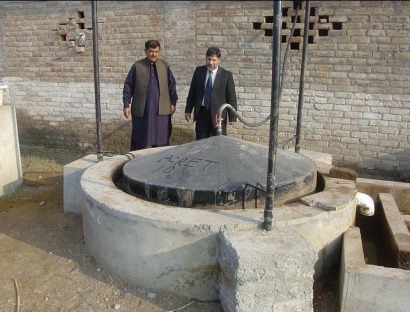
The Small Industries Development Board (SIDB) in Pakistan is one organisation that has realised the potential biogas has to offer developing nations struggling to bring energy to all.
It has launched a new project to roll out at least 400 small and medium biogas plants developed at household level in Peshawar, Abbottabad, Charsadda, Mansehra, Haripur and Nowshera districts, under the management of its director, Dr Syed Akhter Hussain Shah.
The biogas projects were funded by a Pakistan Italian Debt SWAP agreement. According to the spokesman of SIDB, Noman Qasir, biogas can benefit the country in economic, social and environmental sectors. He said that Pakistan did try biogas production in the Seventies, but it did not succeed due to lack of state-of-the-art technology and awareness among communities.
Elswehere, BETA PAK and the Pakistan Dairy Development Company (PDDC) are working through joint ventures in biogas technology development for domestic uses in Pakistan. The MOU has not only helped in identifying and jointly implementing various biogas projects across the country, but has also facilitated private sector biogas technology development by BETA PAK. Under this arrangement the domestic biogas plants already developed by PDDC are being jointly operated and maintained, while developing hundreds of other biogas plants all over the country.
BETA PAK has also signed a MOU with Human Appeal International to develop biogas technology for domestic uses in Khyber Pakhtunkhawa, AJK and Margalla National Park in the Islamabad Capital Territory. So far twenty biogas plants have been completed and handed over to the communities in Samani in, District Bhimber, AJK, while ten domestic have been completed in the Buffer Zone of the Margala National Park in the Islamabad. With a view to bring the mushrooming poultry sector into the biogas net, a domestic biogas plant using poultry waste has also been completed in Mansehra.
BETA PAK and the Punjab Disaster Management Authority are also working to develop a total of 450 domestic biogas plants. Out of this target, work on initially developing 116 plants in the model villages in the disaster affected districts of Liah, Bhakar and Mianwali were nearing completion in September 2011.
3 GW biogas potential
Research conducted by the University of Agriculture in Faisalabad suggests that Pakistan’s sugar industry alone could generate close to 3,000 MW of power through biogas, but is currently hardly producing 700 MW. The study concludes that biogas is the best substitute to conventional fuels.
It also estimates that Pakistan has almost 159 million animals producing approximately 652 million kilogrammes of manure daily from cattle and buffalo alone, which can be used to generate 16.3 million-cubic-metres of biogas per day and 21 million tonnes of bio fertiliser per year.
Economic and social benefits
Highlighting the economic and social benefits of biogas generation, the research indicates that a biogas unit of 10-cubic-metres could save around Rs92,062 per annum. To do so, the report’s authors say, Pakistan shoud learn from the European Union, where countries must produce at least 22.1 per cent of their electricity from renewable resources by 2020.
By following the same rules, they say, Pakistan could ensure nearly 70 per cent of the country’s rural population could benefit from biogas energy. Research discloses that demand for small biogas power generation units is increasing steadily as this decentralised source of energy can ensure uninterrupted power supply to villages.
Roll-out of 10,000 units in 5 years
The study also recommends that the country could explore using citrus pulp, waste from the paper industry, slaughter house and street waste to generate biogas. The Pakistan government launched the Biogas Support Program (BSP) in 2000, which has achieved a target of installing some 1,200 biogas units around the country, while the projects described above are contributing to ensure an additional 10,000 units are rolled out over the next five years, tapping almost 27 per cent of the country’s biogas potential.
[Photo: Courtesy of Biogas Plant Design blog]
For additional information:

